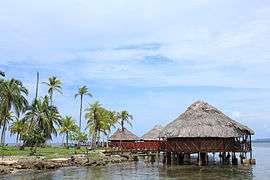Ukupseni
Ukupseni, also called Playón Chico, is one of the most populous islands in the Guna Yala territory of Panama, 100 metres (330 ft) from the mainland. The literal translation for Ukupseni is "little beach" in English, or playa chica in Spanish, thus Playón Chico is a mistranslation, which means roughly "Little Big Beach".
Ukupseni is a small island, roughly ¼–⅓ mi², or 300–400 yd². The population of the island is about 3,000, which gives Ukupseni a population density of 8,000–12,000 people per square mile.
Housing
.jpg)
Ukupseni is populated by Kuna. The typical housing structure is a "pole"-style thatch hut, which will house an entire family. Building materials are tree trunks for the main pillars, bamboo poles for support, and various types of leaves for the roof. Walls are typically lashed bamboo or caña blanca (cane). A well-constructed hut can stand for as long as 30 years.
The elderly will often be cared for by their children, and so one family dwelling will often house several generations.
Transportation
Ukupseni lays approximately 100 metres (330 ft) from the Panama mainland. Playón Chico Airport (IATA: PYC) is located on the mainland adjacent to the island. Ukupseni is only reachable by plane, boat, or by foot.
There is no road to Ukupseni. There is now a bridge connecting Ukupseni to the mainland. This is extremely useful, as the majority of local agriculture, schooling, the airport, and potable water are on the mainland.
Aside from the bridge, the second most popular form of transportation is the kayuco (hollowed-out tree canoe). Kayucos range in sizes and styles. Extremely large kayucos, some more than 4 ft wide are used, and others vary in size down to one-person boats.
A typical kayuco is similar to a Western-style canoe. Even though kayukos travel in the ocean they do not have a lateral brace and balance as found on Polynesian ocean-going craft. A distinct, low-profile kayuco is used for navigating rivers.
Economy

Ukupseni is mostly autonomous, in that it grows most of its own food. Colombian ships travel through Kuna Yala, and Kunas sell coconuts in exchange for goods, including hammocks and other supplies. Lobster, crab, and fish are sold to seafood airplanes on the Ukupseni airstrip.
Community projects are conducted by the local government for various needs throughout the year, and every citizen is required to help.
There are two lodges in private islands nearby, Yandup island and Iskardup island. Both are owned and ran by Kunas from Ukupseni, as it is part of the Kuna law that only Kunas can own businesses in Kuna Yala. These lodges also provide jobs as guides, cooks, handymen, maids and other works to Ukupseni's inhabitants, plus a larger income for fishermen and handicraft sellers, being the Mola the most famous handicraft of the Kunas.
Geography
Ukupseni, along with the vast majority of the rest of the San Blas Islands lies atop a coral reef that has broken the surface of the ocean. This island is enlarged constantly by people depositing earth, rock, waste, or other debris in order to create a large living area on the island. The elevation of these islands is about 1½ feet above sea level.
Local tides in the area fluctuate the level of the water by 4–11 inches. Occasionally a "super-high tide" of about 18 inches will saturate the outer parts of the island.
There are several reef islands in close proximity to Ukupseni. Most are not inhabited, but some have tourist hotels on them. The closest populated island is San Ignacio de Tupile, a few miles due east. The mainland communities of Irgandi and Ukupa lie to the northwest.